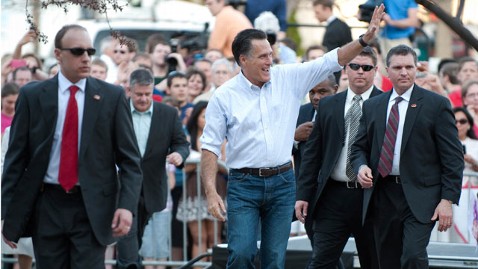Romney's Vice Presidential Checklist

(Image Credit: Don Emmert/AFP/Getty Images)
The speculation season is well underway. Washington, D.C., is a buzz with theories about who Mitt Romney might possibly pick as his vice president. Will he go for a "safe" pick? An "outside the box" selection? Will he factor in race, gender, geography? The possibilities seem virtually endless.
However, pundit theories aside, Romney has his own checklist in mind for this process, and though it isn't necessarily lengthy, it's still a tall order.
"The first thing is he needs somebody who the people of the country will look at that individual and say if anything ever god forbid happened to Mitt Romney, this person could be president," says Robert Maginn, chairman of the Massachusetts Republican party.
"So it's almost like-the first rule is don't be cute, don't try to pick somebody who is going to bring a swing state, or bring a demographic, you pick the person who you honestly believe could step in the Oval Office and run the free world and run the country. "
"The second thing is, there's gotta be good personal chemistry. The president and the vice president have to work together very well. So there's a personal connection that has to be there, they have to be able to help each other, advise each other," Maginn explains.
"Those are the two most important factors and then you can say that from there, you can think about what balance does the person bring to the ticket?" Maginn asks.
That balance of course offers the best lead for speculation. Who balances out the successful businessman and former governor of Massachusetts?
Maginn notes that Mitt often cites Reagan's selection of George H.W. Bush as a good example of that balance.
"He's given examples of Ronald Reagan choosing George Herbert Walker Bush. Reagan was an outsider and brought certain kinds of experience, but George Bush brought different kinds of experience."
In 1980 Ronald Reagan, the then former governor of California, had never spent time in Washington, D.C. After a very strong primary challenge to Gerald Ford in 1976, Reagan had been the favorite to win the nomination in 1980 all along, but that cycle he had a strong challenger in former congressman and head of the CIA George H.W. Bush.
Bush brought a different set of cards to the table-namely foreign policy experience and Washington, D.C. experience. He had served as ambassador to the United Nations under Nixon, he had been the liaison to the then People's Republic of China (with whom the U.S. did not have an embassy at the time, so there was no ambassador) and he had served as chairman of the Republican National Committee. Plus, representing Texas he brought geographic diversity.
Bush brought the balance Reagan needed, so Reagan chose him for the VP slot.
Romney's list may seem straightforward, and in a lot of ways it is. Still, selecting someone who you not only believe can actually run the country, but who you also have a strong chemistry with, and who balances you out, is no simple task.
Of course, checklist and models aside, it's still a game of speculation for the foreseeable future.